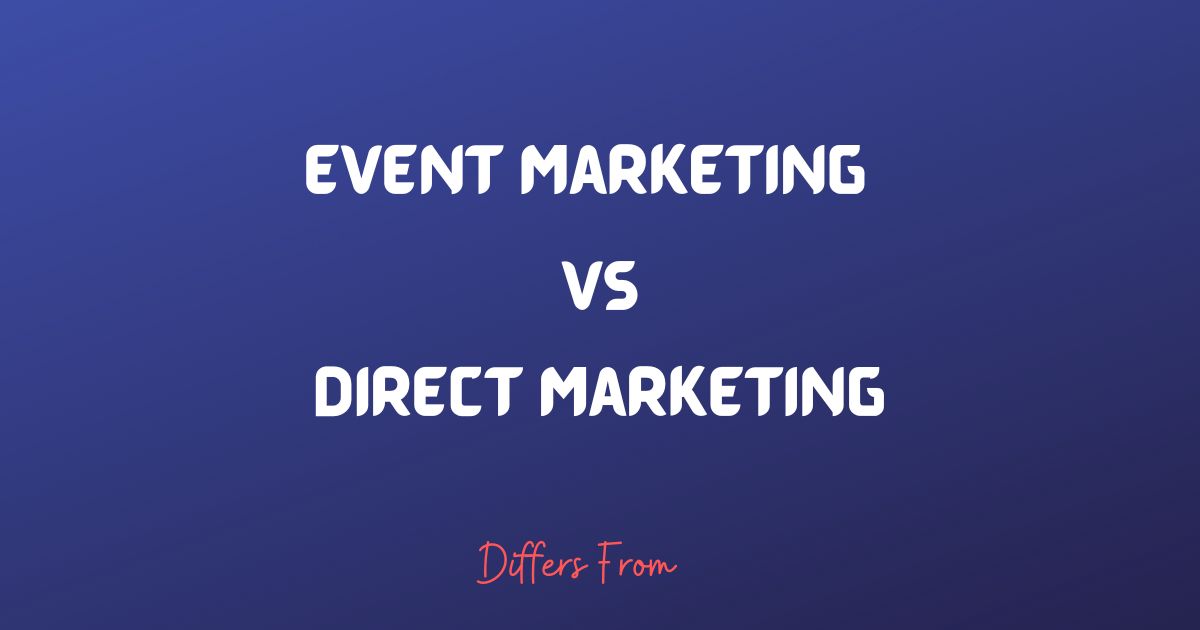Welcome to our blog, where we dive into the world of marketing strategies and shed light on the key distinctions between two powerful approaches: Event Marketing and Direct Marketing. In the ever-evolving landscape of marketing, understanding the nuances of these methods is crucial for businesses seeking to make a lasting impact. Join us as we explore the fundamental differences that set these strategies apart and discover which one might be the best fit for your marketing goals. Whether you’re a seasoned marketer or just starting your journey, this insightful comparison will provide valuable insights to help you make informed decisions and drive success in your marketing endeavors.
Difference between event marketing and direct marketing
| Event Marketing | Direct Marketing | |
| Focuses on creating experiences | Event marketing aims to provide unique and memorable experiences to engage the audience. | Direct marketing communicates directly with individuals through channels like email, direct mail, or telemarketing. |
| Builds brand awareness | Direct marketing campaigns can be more cost-effective, especially through digital channels, and are accessible to businesses of all sizes. | Direct marketing allows for precise targeting by segmenting the audience based on demographics or preferences. |
| Emphasizes emotional connections | events foster emotional connections between attendees and the brand, creating a deeper relationship. | The goal of direct marketing is to generate immediate responses or actions from the audience. |
| Face-to-face interaction | Events allow for in-person interaction, networking, and building personal relationships with the audience. | Direct marketing campaigns enable tracking and measuring response rates and conversion success. |
| Long-term relationship building | Event marketing focuses on building long-term customer relationships and loyalty. | Direct marketing is effective when immediate responses or conversions are desired. |
| Higher cost | Organizing events can involve substantial costs for venue, production, logistics, and marketing. | Direct marketing campaigns can be more cost-effective, especially through digital channels, and are accessible for businesses of all sizes. |
| Suitable for larger organizations | Event marketing is typically more suitable for organizations with the budget and resources to execute large-scale events effectively. | Direct marketing is effective when immediate responses or conversions are desired. |
What is event marketing?
Event marketing is a strategic approach that involves organizing and hosting events to promote products, services, or brands. It aims to create memorable experiences that engage and connect with target audiences.
Despite the myth that event marketing is only for large corporations, it can be effective for businesses of all sizes, fostering brand awareness and customer loyalty.
What is direct marketing?
Direct marketing is a promotional strategy that involves directly reaching out to individuals to generate immediate responses or sales. It utilizes various channels such as email, direct mail, telemarketing, and social media to communicate with potential customers.
According to the Data & Marketing Association, direct mail has a response rate of 4.9% for prospect lists and 9% for house lists, showcasing its effectiveness in driving customer engagement and conversions.
Comparison between event marketing and direct marketing
Event marketing emphasizes creating memorable experiences, fostering brand loyalty, and emotional connections with the audience.
On the other hand, direct marketing focuses on personalized communication, immediate responses, and generating sales or conversions. Each approach has its strengths and suitability based on marketing objectives, target audience, budget, and desired outcomes.
Event marketing and direct marketing are two distinct approaches to promoting products or services. Let’s delve deeper into their characteristics and differences:
Nature and Purpose
Event Marketing: Event marketing focuses on creating unique experiences or gatherings to engage target audiences.
It aims to foster emotional connections, build brand awareness, and generate positive brand associations through interactive and immersive activities.
Direct Marketing: Direct marketing aims to reach out to individuals directly, delivering targeted messages and offers to prompt immediate responses.
It focuses on generating sales, leads, or conversions through personalized communication and direct call-to-action.
Audience Engagement
Event Marketing: Events provide a platform for face-to-face interaction, enabling direct engagement with attendees.
It allows for building personal relationships, capturing attention, and fostering a deeper connection between the brand and the audience.
Direct Marketing: Direct marketing typically relies on one-way communication channels such as email, direct mail, or telemarketing.
While personalization is possible, it lacks the immersive and interactive nature of events.
Reach and Targeting
Event Marketing: Events can attract a large audience, ranging from a few hundred to thousands of attendees. However, the reach is limited to those who attend the event physically or virtually.
Direct Marketing: Direct marketing allows for precise targeting by segmenting the audience based on demographics, preferences, or previous interactions. It enables reaching a wider audience beyond event attendees.
Immediate Response and Conversion
Event Marketing: Event marketing may not always lead to immediate sales or conversions. Its primary focus is on creating brand awareness, generating leads, and building long-term customer relationships.
Conversion rates may vary depending on the event’s objectives and follow-up strategies.
Direct Marketing: Direct marketing aims to drive immediate responses and conversions. It often includes clear calls to action, such as making a purchase, subscribing to a service, or filling out a form.
It allows for tracking and measuring response rates and conversion success more directly.
Cost and Scale
Event Marketing: Organizing events can involve substantial costs, including venue rentals, event production, logistics, and marketing. It is typically more suitable for larger organizations with the budget and resources to execute such events effectively.
Direct Marketing: Direct marketing campaigns can be more cost-effective, especially through digital channels. It is scalable and accessible for businesses of all sizes, allowing them to target specific audiences within their budget constraints.
Conclusion
Event marketing focuses on creating memorable experiences, fostering emotional connections, and building long-term relationships with attendees.
Direct marketing, on the other hand, aims to generate immediate responses and conversions through targeted communication channels.
While event marketing is suited for brand awareness and relationship building, direct marketing is effective for prompt action and measurable results.

